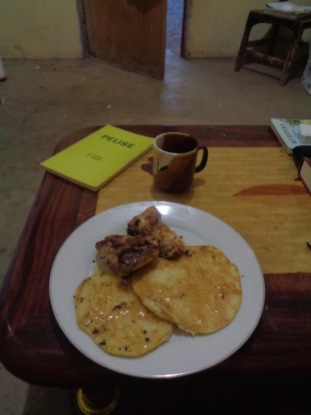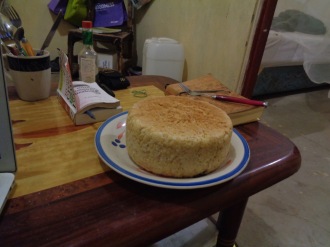I’ve always loved to cook. As soon as my eyes could peek over the stove top I was cooking simple things: scrambled eggs, grilled cheese, toast, etc.. Part of this was from the necessity created by growing up in a single parent household, but the other part was a strong appreciation for good cooking, an appreciation that tends to build in most who grew up watching Italian-American women work their magic in the kitchen. Of all of the lessons my mother and grandmother have taught me, to know my way around a kitchen is easily one of the most valuable.
The memories flowing through my mind right now as I write this are some of my fondest. Watching Gram roll out the homemade pizza dough; sitting anxiously on the edge of a chair, leaning on the kitchen table, supported by my elbows, until she commanded me to fork the dough, spread the sauce and add the toppings- cheese last, always. I loved entering her house through the side door, into the garage, catching a whiff of the honey glazed and herb roasted potatoes that were baking alongside of the breaded boneless chicken thighs, all to be preceded with a fresh salad – romaine, shredded carrots, sliced apple, and radishes; oil and vinegar dressing. I can’t even talk about her raviolis other than to say “oh my God.”
Of course not all of my memories of my Gram our flowery and peaceful. She is all of about four feet ten inches, but knows how to crack the whip. At times, she would pull up outside of our house in her blue minivan, and my brothers and I would immediately go into a frenzy. Any friends that may have been around would run out the back door, while we started dumping out our mother’s ash trays, who was still trying to hide smoking from a mom of her own. We cleaned what little we could before she would come in screaming and cracking us with “the pot spoon.” There would be a cacophony of vacuums, scrubbing, shouting and crying boys for two hours; it was almost traumatizing. After it was all over, a calm would come over a beautifully cleaned home, and she would make lunch. One of my favorites was a unique take on french toast, where she would break up the bread into pieces and make a little simple syrup with brown sugar to go with it. And once again, through the magic of food, all was right with the world.
Sometimes my uncle laughs at home much I admire my gram’s cooking, because he can remember growing up it wasn’t always so good. Apparently, none could match her ability to overcook a piece of meat. Although, he turned out be quite a good cook himself, so he had to pick up a couple things from his dear mother. And let me not forget about my own mother. She has a lot of meatballs, shepherd’s pie, chicken salads, roasts, and cheesesteaks to cook when I get home, mmm..mmm…good.
The point is that meals have meaning back home. Frequently they can, and are, interpreted as expressions of love. Certain meals tell new or long time partners how much we love them. Cooking a person’s favorite meal can comfort them during their time of need or say congratulations for a job well done. We change our style of cooking to match the season- vats full of chili and huge pots of bolognese; welcoming a few extra pounds to stay warm in the winter. Then we make our transitions to lighter foods and more salads in the warmer months, salivating as the strawberries ripen, and practically doing backflips after picking that first perfect tomato off the stand in mid summer. Hoping every knock on your door is your neighbor, finally, there to hand you a jar of her neighborhood famous pickles. Burgers anytime of year, because freakin burgers! As the fall comes we start looking forward to ripening apples, pears and the pies that inevitably come with them, or even various game birds; foods that will eventually make up our Thanksgiving dinner. Then there is pizza anytime, because freakin pizza!
Obviously, meals mean a little more to me than simply caloric intake and vitamins for healthy hair and nails. Unfortunately, it’s just not the same here. Yes, meals are part of most celebrations, and if you travel around enough you can have some pretty positive and unique culinary experiences. But honestly, in my region there just isn’t much value placed on a variety or even quality of food, and I doubt that people’s diets have changed much at all over the last half century.
Even though that at events, business or otherwise, it is customary to provide food, many don’t show up to necessarily share in an experience, but more so to get as much free food as possible. I know it sounds harsh, but I have been to enough events and watched the flood of late comers rush the food table, and walk away with overflowing plates with togo containers already filled to take home. They eat, they leave, that’s it. There would be some serious arguments and maybe even some flying fists if that happened at most events in the US. I think that is because there is a general understanding that any food provided at a party or business meeting is meant as thanks for being present and participating in the celebration, seminar, meeting, mourning or whatever else. To show up just for the food is plain and simply insulting to the hosts and the guests alike. I do ask that you try to believe that this is not judgment on my part, and I understand what function the food serves for events here. The food is expectation and enticement to get people to come to your event. And there really isn’t much outrage here if some people do come just for the food. As the saying “in Africa we share” implies, if a few hungry people end up getting a free meal out of it and nothing else, well then nawa tupu (that’s fine) and “it’s God’s will.”
The general concern for children when preparing meals is also quite different here; in that there really isn’t much concern for them at all. Children usually get what is left over after all of the adults have been served. Adults are commonly seen sitting on chairs, sharing in plates of meet, porridge, and salad, while the children are on the ground outside splitting a large bowl of yisima, while the dogs sit behind them waiting for the scraps of the scraps. It can be difficult to see a large well fed woman with a malnourished child, or seeing the developmental differences of children living on the same homesteads, due to unequal treatment based on family histories. For example, immediate members of the family vs. extended members vs. the orphaned children, each type of family member suffering more, respectively.
Although I miss the food back home, and all of the social and family ties that go along with, I am finding ways to keep traditions alive and satisfy some of my old cravings. Admittedly, I don’t have the most ideal kitchen to work with, and getting to a grocery store somewhat comparable to one back home is a bit of a chore; however, with the foundation set for me as a child, some ingenuity, and a passion for cooking, I think I have been able to whip up some pretty decent meals thus far. When I miss diners, I make hash brown, egg, tomato and pepper scrambles. When I am missing brunch, I whip up some maize meal pancakes with pan fried chicken. When I am missing the fall, especially at my uncle’s in upstate New York, I make some delicious homemade pot bread (easy smokers, I mean bread made inside of a pot on a hotplate) and french press some awesome coffee sent to me from some great friend back home; all of this does wonders for my state of mind.
So far I am doing alright making meals to keep my spirits up, but next I need to build that social component. I would love to be able to call up a couple of guys and invite them over for a late breakfast or early lunch, drink some coffee, and shoot the shit. All in do time. Below is a little gallery of some meals currently in my repertoire.
(Also, I know there are plenty of negatives in the US surrounding food to discuss…wastefulness, pesticides, factory farming, obesity, over processing, hungry children and an underfed working class. But there is a healthy culture and tradition as well that could be harnessed to combat some of those issues. I think anyway, how about you?)
.
As always, thanks for reading and let’s eat!













Leave a comment